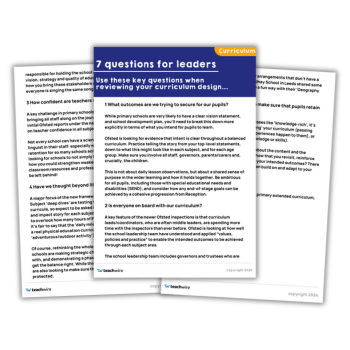In this Ofsted framework PDF, Pearson project manager Eylan Ezekiel identifies 7 key questions that school leaders should be asking when reviewing their curriculum design, discussing thinking points around each one.
Ofsted framework questions
The questions will help you to consider:
- Outcomes for pupils
- Staff buy-in
- Subject knowledge
- Intent, implementation, impact
- Cultural capital
- Progress data
- Learning retention
Securing outcomes
The first question Eylan considers is this: What outcomes are we trying to secure for our pupils?
While primary schools are very likely to have a clear vision statement, and school development plan, you’ll need to break this down more explicitly in terms of what you intend for pupils to learn.
Ofsted is looking for evidence that intent is clear throughout a balanced curriculum. Practice telling the story from your top-level statements, down to what this might look like in each subject, and for each age group. Make sure you involve all staff, governors, parents/carers and, crucially, the children.
This is not about daily lesson observations, but about a shared sense of purpose in the wider learning and how it holds together.
Be ambitious for all pupils, including those with SEND, and consider how any end-of-stage goals can be achieved by a cohesive progression from Reception.
Curriculum design
Watch two Pearson product managers talk about how schools approach curriculum design.
Get more help and advice about the Ofsted inspection framework here.














